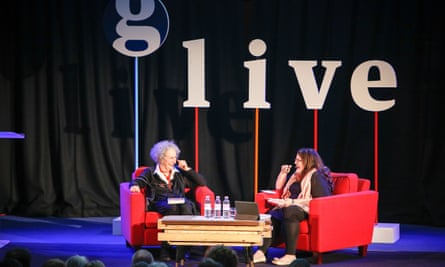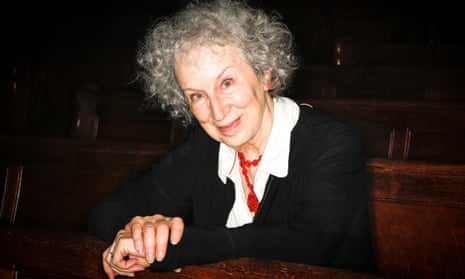The Handmaid’s Tale is set in a post-crisis US twisted by religious fervour into a totalitarian theocracy. In the MaddAddam trilogy, religion is a political tool used by hypocrites for individual gain. In The Blind Assassin, one character thinks, “Gods always come in handy, they justify almost anything.”
In the light of this running commentary on organised religion, it is ironic that Margaret Atwood delivers her Guardian Live talk in a church – an irony that is not lost on the author. As members of the audience line up to ask questions, she eyes them with her particular brand of formidable twinkliness. “Testify,” she calls to them, in her dry, Canadian drawl. “Testify and repent!”
‘You can cheat by increasing the type size’
With more than 40 works, five Man Booker nominations and a win under her belt, does she consider herself prolific? She scoffs at the word. “Joyce Carol Oates is prolific; I’m just old,” she says, drawing out the last word for laughs. At 75, she says writing hasn’t become any easier, listing her main distractions as laundry and emails. She sets herself a “schedule of pages rather than a schedule of times” aiming to write three to five pages a day. “You can cheat by increasing the type size,” she says. “Then you get really motivated and feel like you’re really speeding along.”
Atwood’s latest novel, The Heart Goes Last, is a triumphant return to what she calls “speculative fiction”; her unique twist of fiction and science fiction, dystopia uncomfortably close to reality. The main characters, married couple Charmaine and Stan, are driven by complete financial and societal collapse to take part in a social experiment run by a private prison company called Positron.
Escaping from the anarchy outside, they alternate each month between a prison and an idyllic, 1950s suburbia constructed as a sweetener for the participating inmates. It is an unnerving, dark satire full of questions about humanity; the evening’s interviewer, British author Naomi Alderman, calls the book “good fun”.
“It is a bit dark to be good fun, Naomi,” Atwood says sternly, before continuing conspiratorially, “What we think is good fun, others might not.”
‘Humans desire robots because we can mould them to our tastes’
Despite her fiction being termed “speculative”, Atwood says everything is inspired by reality. “There are for-profit prisons operating in the US, though they are not as superficially pleasant as this one,” she says. “It’s all real.” In prison, Stan builds robots designed for sex called Prostibots; Atwood recently tweeted a story about a robotics company pleading buyers not to have sex with their robots. “[Humans] desire robots because we can mould them to our taste, and fear them because what they could decide to do themselves,” she says.
Softbank tells customers to not have sex or ‘indecent behavior’ with robot http://t.co/q4WEXWwmAK #TheHeartGoesLast
— Margaret E. Atwood (@MargaretAtwood) September 27, 2015
“There is a lot of interesting sex in this novel,” Alderman says, and Atwood delivers the line of the night, deadpan: “Well, you have to keep yourself awake somehow.”
Atwood is active on Twitter, but says she is not the target of the usual misogyny directed at opinionated, outspoken women on the internet. “I don’t give a rat’s ass because I am old,” she says. “I don’t get the double whammy that young women get, because they are attractive, sexual objects.” When she was younger, she got letters, with things underlined in red and green ink, with capital letters. “You knew the person was a nut.” But now, the anonymity of the internet “indulges aggressive yelling, this sexual sadistic expression. But these are not happy people, they’re not having a fun time.”
Atwood’s last few works have been about survival: the MaddAddam (2003, 2009, 2013) trilogy explored a future, post-apocalyptic Earth; she recently wrote an essay about government control and the future of privacy; and often tweets news of discoveries in technology, science exploration, genetics. Where does her fascination with the future come from?

The importance of matches and axes
“It is a human thing,” says Atwood, before bringing up the huge increase in dystopian entertainment – films, novels, TV shows. “People are interested in knowing how human beings hold out. The human race has been through similar bottlenecks in its past, long ago. It is that lingering question: ‘What would you do if all the lights went off?’”
Alderman likens the popularity of dystopian entertainment to a rehearsal: “We need to know that we could figure out what to do and what we need.”
“Matches,” Atwood fires back, as if she’s thought about it before. “Matches and axes.”
In The Heart Goes Last, Charmaine contacts Positron after seeing pictures of the clean, superficial suburbia they will be provided with. Surrounded by fear and disorder, she lingers over images of towels and cheese plates. “But it’s not just towels and cheese, it’s the safety those things represent,” says Atwood. People would be prepared to sign up for a scheme so false because humans love structure, she continues. “There is something reassuring about knowing what is coming. This is why some people never change who they vote for; even if they are dissatisfied, they don’t want to change what the rules are and therefore what they have to deal with.”
If her fiction is speculative, then Atwood must see some potential for some of her ideas to become reality. Does she have hope for humanity? “Well, we’re very smart,” she says. “We’re working away at our problems as we speak. But what will get to us first, the genius solutions to our problems or the problems?”
Margaret Atwood was speaking at a Guardian Live Members’ event. Find out what else is coming up and how to sign up as a Guardian Member.

Comments (…)
Sign in or create your Guardian account to join the discussion